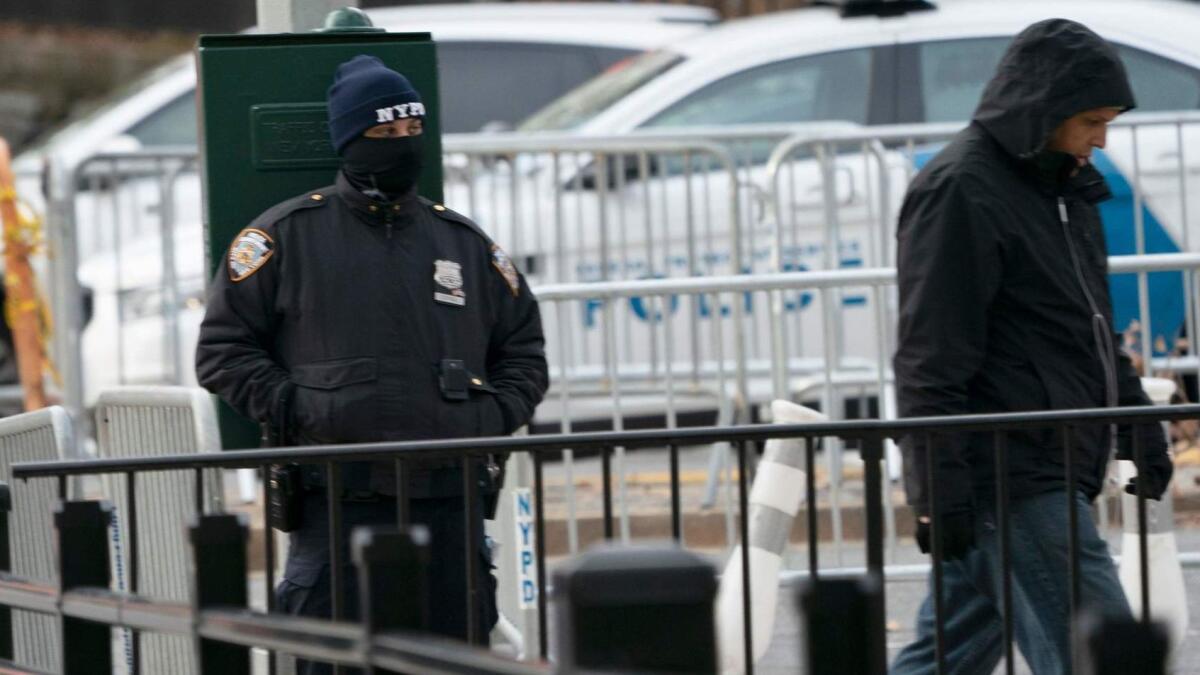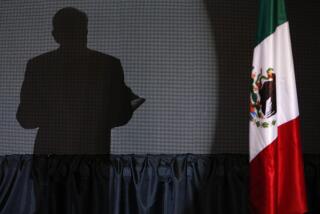‘El Chapo’ trial is treated as a nuclear and conventional terrorism target

- Share via
Reporting from New York City — At the downtown Brooklyn federal courthouse where Mexican drug kingpin Joaquin “El Chapo” Guzman is on trial, New York Police Department snipers roam the rooftops and K-9 units prowl the halls.
The Brooklyn Bridge closes whenever the defendant is transported to court from Manhattan, and even attorneys must take off their shoes at the new TSA-style checkpoint outside the courtroom.
With such a conspicuous show of force, it’s easy to overlook the two or three servicemen at a small fold-out table near the X-ray machine in the lobby, quietly scanning the Eastern District of New York courthouse grounds for explosives, biological weapons and dirty bombs.
The soldiers and airmen are members of the National Guard’s 24th Weapons of Mass Destruction Civil Support Team — “Civil Support for short, so it’s less scary,” their spokesman said — an elite corps of threat specialists who headline counter-terrorism efforts at the city’s biggest events.
“They’ll be on duty for the Macy’s Thanksgiving Day Parade,” said Eric Durr, public affairs director for the National Guard’s New York State division. “Anything that could possibly be considered some sort of target, we have one of our teams there.”
Members of the strike team stationed at the courthouse last week said they also provided security for the U.N. General Assembly, New Year’s Eve in Times Square and the U.S. Open tennis tournament in Queens.
It’s an interesting gig, though their service isn’t always appreciated.
“Two brown guys in backpacks — we get a lot of dirty looks,” said one Latino veteran of the Afghanistan conflict, who declined to give his name because he wasn’t authorized to speak to the media.
The Guzman trial, the guardsmen said, marked their first appearance in court.
“What they look for is something that’s really high-profile, something that gets a lot of media coverage,” said Andrew Karam, a New York-based private radiological security specialist who has worked alongside the military strike team for years. “Anyplace where you get a lot of people gathered in conjunction with a lot of reporters and cameras, it starts looking more attractive to terrorists.”
Although Guzman himself is notorious, it’s the swarm of reporters lining up before dawn to secure a spot in the courtroom and the flock of photographers camped outside all day for a single snap of his former beauty queen wife that make the otherwise unremarkable building a potential target, Karam said.
The strike team arrays rucksacks of gadgets around a small plastic banquet table just inside the building’s tall glass facade, on the edge of the security line. Each guardsman is armed with a mobile lab and a toolkit of futuristic sensors that scan for chemical, biological, radiological and nuclear material, as well as explosives. Most of the scanning gear is so small it can slip inside a pocket, and so sensitive that the strike team can tell when a passerby is being treated for heart trouble or cancer.
“If you had a thyroid scan or a bone scan, we’d figure out it was you,” said Karam, the security expert. “Thallium 201 — that’s usually used for doing heart scans. If I picked up Iodine 131, my first thought would be thyroid cancer.”
The machines are designed to detect nuclear waste and other radiological threats, though Karam said he’s never found any in New York. Other parts of the kit are deployed to inspect suspicious powders or packages for biohazards. The team is also equipped to search for trace explosives from conventional bombs.
All told, 11 of the 24th Civil Support team’s service members have been detailed to New York’s Eastern District for the trial, which is expected to continue for four months. That’s a small fraction of the law enforcement officers who have descended on the courthouse since the trial began this month.
Rifle-toting NYPD snipers can be seen from the hallway outside Federal District Judge Brian Cogan’s courtroom, but the department declined to comment on its presence, saying the U.S. Marshals Service was coordinating security.
“The U.S. Marshals are responsible for the protection of the federal judicial process, and we take that responsibility very seriously,” the agency said in an email. “While we do not discuss our specific security measures, we continuously review the security measures in place and take appropriate steps to provide additional protection when it is warranted.”
The Department of Homeland Security also has jurisdiction over the courthouse, but its authority more or less starts at the sidewalk and ends at the door, Federal Protective Service spokesman Robert Sperling said. Exactly how many officers, and what types, are required to secure the trial of the world’s most famous drug trafficker is a closely held secret, he said.
“We don’t really talk about numbers or what our tactics or procedures are,” Sperling said. “When it comes to security, we really don’t talk about what it takes to make the sausage.”
Sharp is a special correspondent.
Days of testimony about drugs and killings in ‘El Chapo’ trial seem to bore jurors »
Sharp is a special correspondent.
More to Read
Sign up for Essential California
The most important California stories and recommendations in your inbox every morning.
You may occasionally receive promotional content from the Los Angeles Times.











